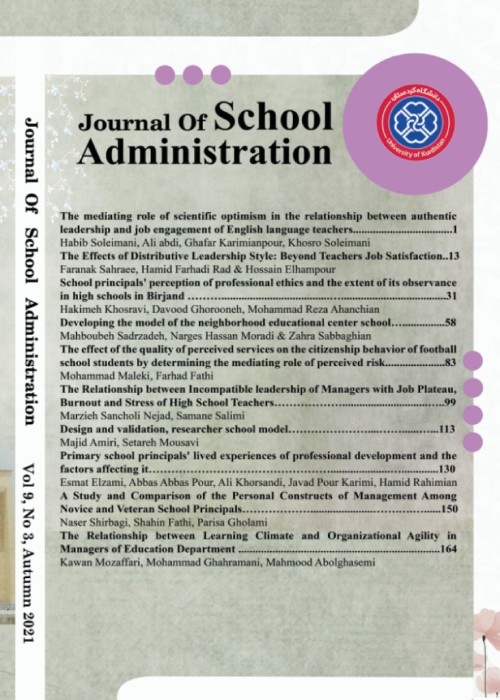Designing a quality process model for implementing school management excellence program
Author(s):
Article Type:
Research/Original Article (دارای رتبه معتبر)
Abstract:
School excellence" is derived from organizational excellence and a new subject. Because this issue is older outside Iran, various researches have been done in this field, but in Iran, due to its infancy, not much research is observed, and it does not have the necessary support for field studies and is a model for quality. Implementation has not been presented, and the results of research emphasize the need for field-based research One of the issues that is felt in the implementation of the school excellence program in Iran is that; Stakeholder participation in the implementation of the school excellence program does not exceed the level of student participation in the implementation of extracurricular activities and cooperation with educators in educational matters. The role of parents is especially marginalized in the quality of teaching and learning of students. Therefore, in the current situation, the realization of the idea of a school-centered approach with a bottom-up approach has no place in the school management excellence program. In recent years, many speculations have been made about this program and based on it, amendments have been made to the way of implementing and changing the evaluation indicators.These actions are often aimed at redefining and shifting the criteria and indicators rather than reflecting on its intellectual and theoretical foundations. This is while the effective school literature of regular and accurate efforts, especially problem-oriented and context-oriented, as well as the joint cooperation of policy makers and educational researchers in providing different models of effectiveness and their effective role in forming new intellectual waves in this The constituency tells. The effective and transcendent school is a context-dependent phenomenon. The characteristics of the situation in which the school is culturally, socially, politically, economically, and demographically located essentially overshadow its inputs, processes, and outputs, and this is at odds with the effectiveness of the excellence program. It seems that the necessary groundwork has not been done in terms of manpower training, space, facilities and equipment, all-round efforts of the trustees in planning and proper implementation of the process-oriented program. Therefore, considering this importance, the purpose of this study is to identify the factors affecting the process of implementing the school management excellence program, in order to identify the prerequisites and underlying factors and to provide practical solutions to improve the quality of the excellence program implementation.The main purpose of this study was to identify the effective factors and provide operational model on the performance of school management excellence program. In this research qualitative approach was used by using grounded theory method. Also, 20 supervisors and executives of excellence program were selected by purposeful sampling based on saturation principle. In the data collection, semi - structured interview tools were employed. In order to analyze the data, a systematic coding method has been used in three steps (open coding, axial and selective coding) and the categories that form different parts of the model were grouped into six dimensions. In this study, the coding results show that 550 propositions in describing the perception of observers and implementers are effective factors and requirements of the excellence program. By abstracting concepts and categories from data and classifying similarities based on conceptual relevance and theoretical studies, the reports were summarized into 90 conceptual spectra, 36 sub-categories, and 11 main categories. During the three codings: open coding (OC), axial coding (AC) and selective coding (SC), "quality of program execution" was identified as the central phenomenon of the research. Finally, all categories related to the central phenomenon were organized in five axes (causal, contextual, intervening, strategic and consequential factors).The results of data analysis showed that the quality of implementation of excellence program is influenced by causal factors such as the status of financial and human resources of schools and the amount of effort by the authorities in planning and implementing excellence program. It can also be facilitated by devising desirable strategies such as human resources training, organizational health, and teacher effectiveness, which include contextual factors such as organizational culture, parenting role and environmental factors, and intervening conditions such as; The management and leadership style and characteristics of the principal are influenced, and ultimately, the implementation of the excellence program leads to outcomes such as program-based, self-assessment, school-based and comprehensive quality at school. Considering the emphasis of the Fundamental Transformation Document on improving school management and achieving the appearance of the school in the horizon of Vision 1404, it is suggested that further study be done on the underlying factors affecting the quality of the excellence program and using the findings of this study. In order to be more effective, trustees should evaluate the school's contextual factors for implementing the program and, if the necessary contexts are not available, focus their actions on providing the prerequisites. Because implementation without bedding does not lead to a significant increase in school performance and, except for wasting resources, the goals of the excellence program will not be achieved. Considering the effective role of school principals in the implementation of the program, it is suggested that the appointment of qualified principals be done in accordance with the identified personality traits and managerial knowledge and skills, and that the training of principals be given priority. Also, education stakeholders should improve the method of implementing the program and evaluate the performance of schools in accordance with the type and conditions of the school, and also use the research findings as facilitators to educate and justify the executive agents of the excellence program in special sessions and workshops. Finally, with proper training and explanation, trustees and agents should have a process-oriented approach to the program to monitor the effectiveness of the program during the academic year during the implementation and to remove obstacles to implementation.
Language:
Persian
Published:
Journal of School administration, Volume:8 Issue: 2, 2020
Pages:
140 to 161
magiran.com/p2185361
دانلود و مطالعه متن این مقاله با یکی از روشهای زیر امکان پذیر است:
اشتراک شخصی
با عضویت و پرداخت آنلاین حق اشتراک یکساله به مبلغ 1,390,000ريال میتوانید 70 عنوان مطلب دانلود کنید!
اشتراک سازمانی
به کتابخانه دانشگاه یا محل کار خود پیشنهاد کنید تا اشتراک سازمانی این پایگاه را برای دسترسی نامحدود همه کاربران به متن مطالب تهیه نمایند!
توجه!
- حق عضویت دریافتی صرف حمایت از نشریات عضو و نگهداری، تکمیل و توسعه مگیران میشود.
- پرداخت حق اشتراک و دانلود مقالات اجازه بازنشر آن در سایر رسانههای چاپی و دیجیتال را به کاربر نمیدهد.
In order to view content subscription is required
Personal subscription
Subscribe magiran.com for 70 € euros via PayPal and download 70 articles during a year.
Organization subscription
Please contact us to subscribe your university or library for unlimited access!




